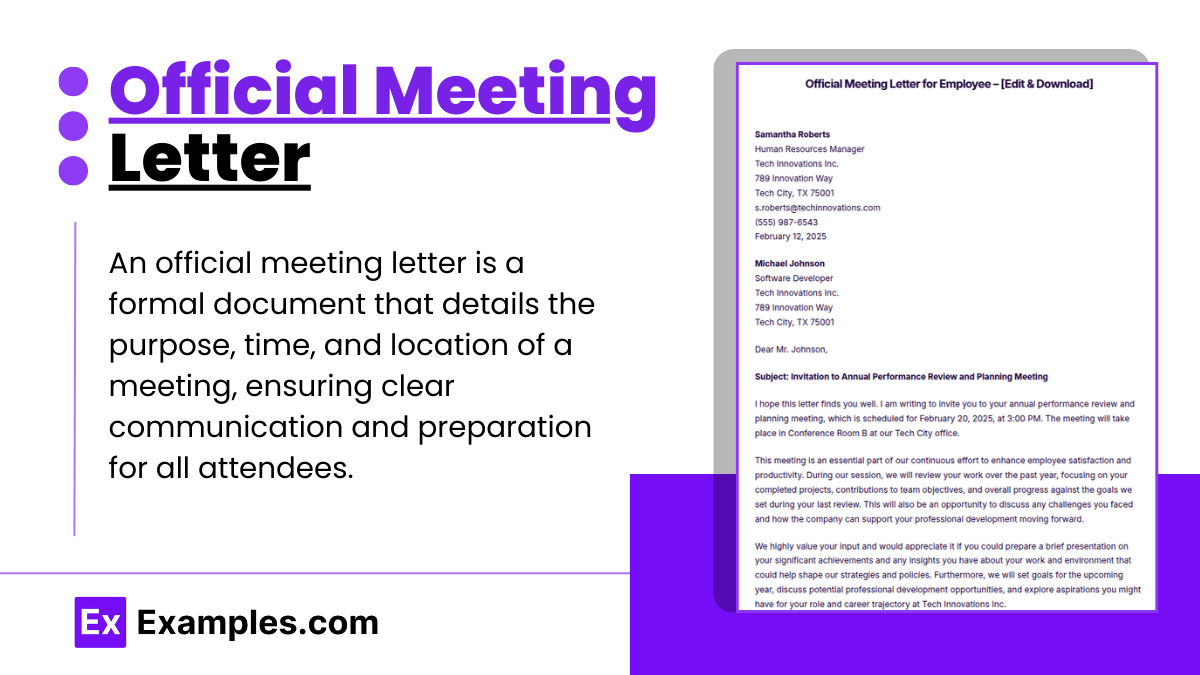7+ Official Meeting Letter Examples to Download
An official meeting letter is a formal document used to inform individuals about a scheduled meeting, detailing the purpose, time, and location of the gathering. It serves as a crucial tool in professional communication, ensuring that all participants are adequately prepared and on the same page. This type of letter is commonly used in business, academic, and organizational settings to facilitate clear and effective coordination. Writing an effective official meeting letter involves clarity, conciseness, and attention to detail, as it not only sets the tone for the meeting but also reflects the professionalism of the organizer.
What is Official Meeting Letter?
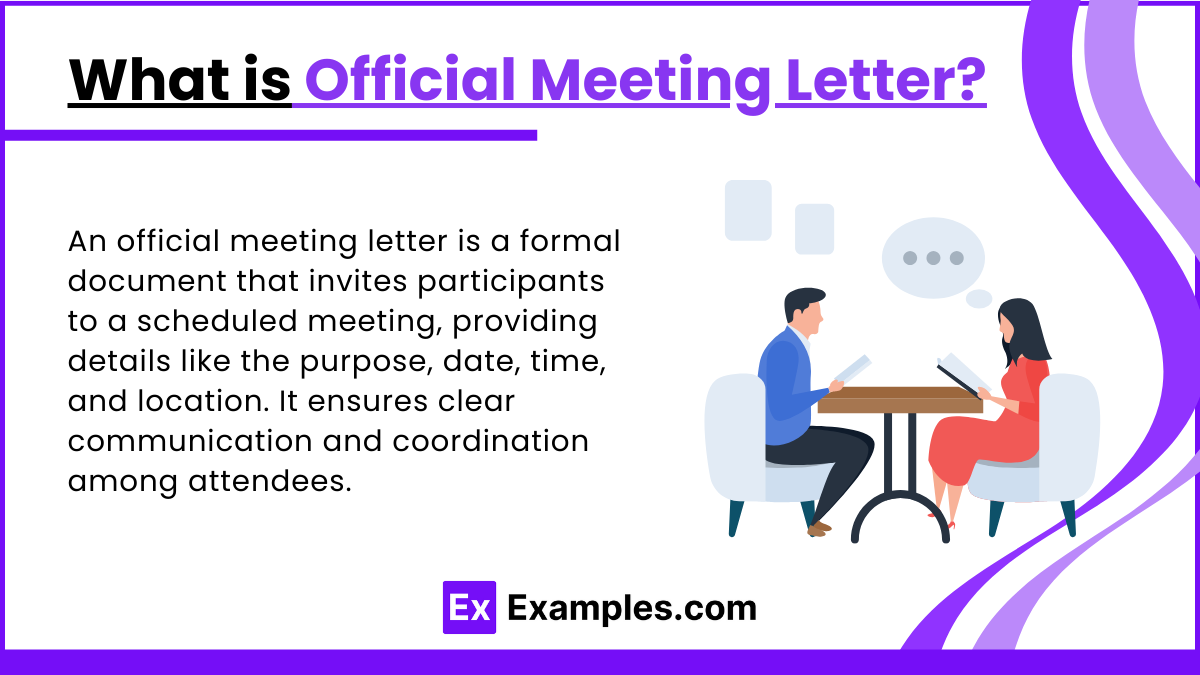
Official Meeting Letter Format
Sender’s Details
Sender’s Name
Sender’s Address
City, State, Zip Code
Email Address
Phone Number
Date
Recipient’s Details
Recipient’s Name
Recipient’s Address
City, State, Zip Code
Salutation
Dear [Recipient’s Name],
Subject Line
Subject: Meeting Invitation – [Purpose of Meeting]
Body of the Letter
I am writing to formally invite you to attend a meeting on [date] at [time]. The meeting will be held at [location]. The main agenda of this meeting is [brief description of the meeting purpose].
Please confirm your availability for the meeting at your earliest convenience. Should you have any questions or require further clarification, do not hesitate to contact me directly.
Closing
Thank you for your attention to this matter. I look forward to your participation.
Sincerely,
Sender’s Signature
Sender’s Name
Position or Title
Organization
Contact Information
Official Meeting Letter Example
John Doe
123 Business Rd.
Business City, NY 54321
john.doe@example.com
(555) 123-4567
October 12, 2025
Jane Smith
Manager
ABC Corporation
456 Corporate Blvd.
Industry City, CA 98765
Dear Ms. Smith,
Subject: Invitation to Strategic Planning Meeting
I am writing to invite you to a strategic planning meeting scheduled for October 20, 2025, at 10:00 AM. The meeting will take place in the main conference room at our headquarters located at 123 Business Rd., Business City, NY. We will be discussing the upcoming year’s projects, goals, and strategies to enhance our team’s effectiveness and efficiency.
Your insights and contributions to the agenda items will be invaluable, and I am eager to have you join us for this important discussion. Please confirm your availability for this meeting by October 15, 2025. If you have any preliminary thoughts or additional topics you would like us to prepare for, please feel free to share them.
Thank you for considering this invitation. I look forward to your participation and valuable contributions.
Sincerely,
John Doe
CEO, Business Inc.
john.doe@example.com
(555) 123-4567
Official Meeting Letter Examples
Official Meeting Letter for Employee
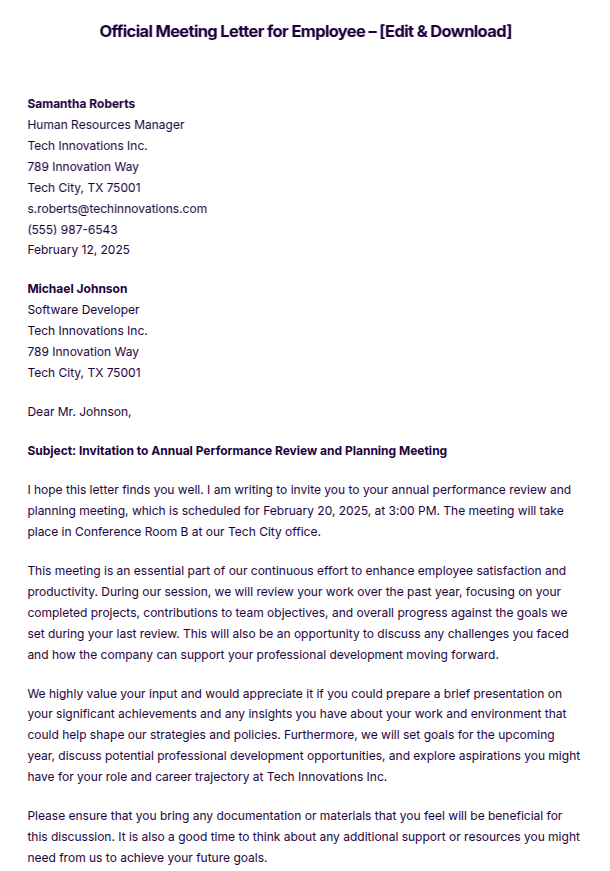
Official Meeting Letter for Invitation
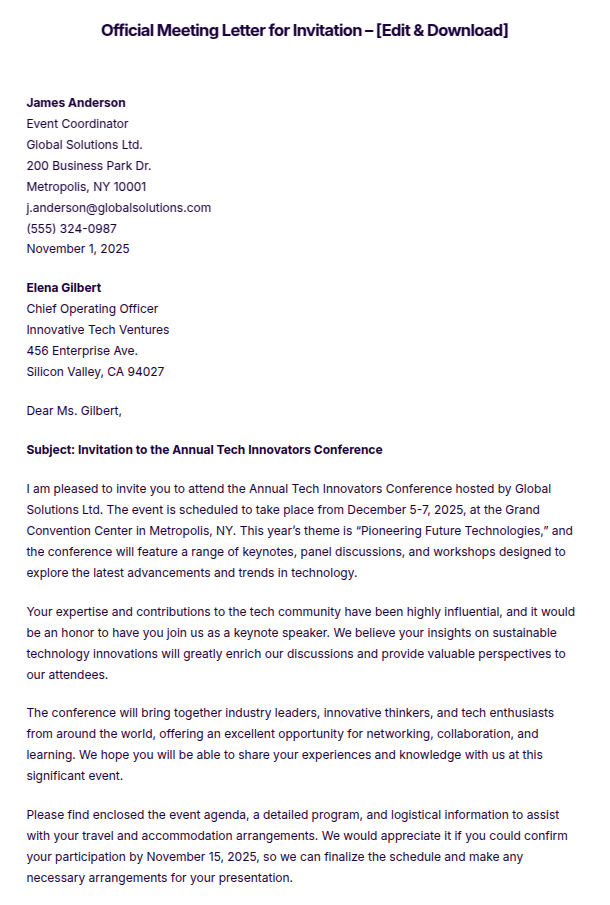
Request for Official Meeting Letter
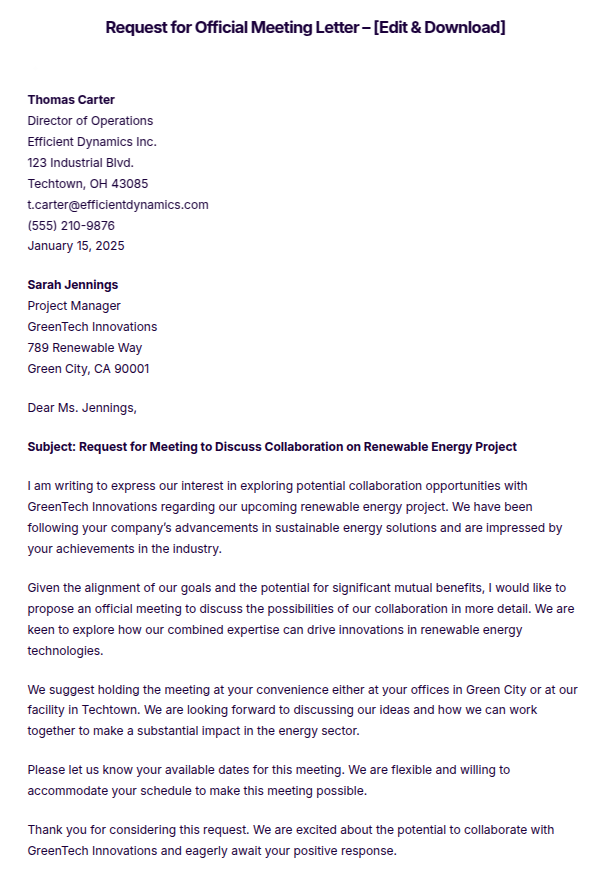
Official Meeting Invitation Template
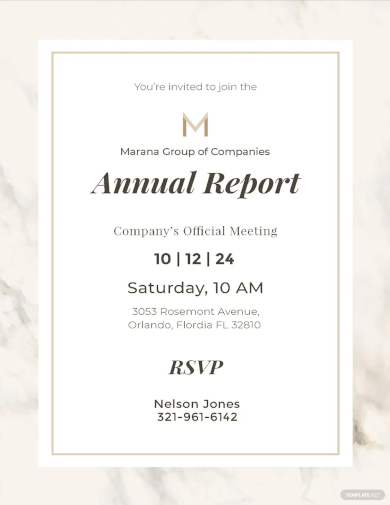
Business Meeting Letter Template
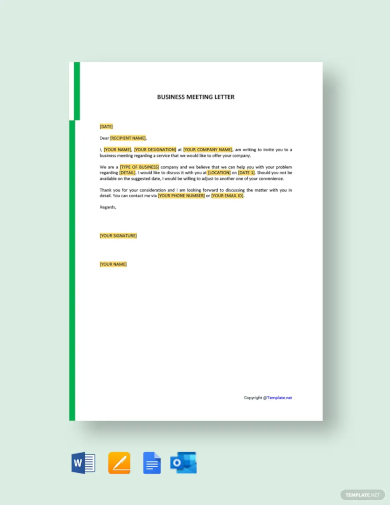
Medical Assistant Meeting Letter Example

New Official Meeting Letter Example

Why Do Businesses Conduct Meetings?
Meetings are essential for any company. It is just not an activity where people sit around and talk about random things. Here are some important reasons why businesses conduct meetings:
Amend policies
Policies are guidelines or rules that companies follow diligently on a regular basis. Each company or business organization has its own set of policies, in which is formulated by the company’s top management (CEO, business owner, board of directors). The policies are then disseminated throughout the entire company for all the employees to apply in their daily work.
Sometimes, policies need to be changed or amended due to various reasons. One venue where policies can be amended is through a meeting. It does not take a single meeting for policies to be amended, even if only one policy is being amended or changed. It requires multiple meetings and deliberations from other employees or officers in the company.
Discuss goals and targets
A meeting can also be a venue where goals or targets are being discussed. These goals can be either financial, sales, or recruitment goals. Similar to meetings where policies are being amended, meetings that discuss goals and targets are not usually one-off meetings. These kinds of meetings are discussed by month or by quarter depending on how often the company sets its goals.
Promotion
There are also meetings that aim to discuss employees being promoted. Before the employee is promoted, his immediate supervisor, the human resource manager, and another company officer discuss the possible promotion of the said employee (his new position, the department where he will be transferred or assigned to, new salary package). After the promotion is finalized, another meeting is set with the employee and the human resource manager.
Discuss investment opportunities
Meetings are not only conducted between company personnel but with company personnel and individuals outside the company as well. These types of meetings mostly center on investment opportunities. The importance of investment can never be understated for any type of business organization. Investment is needed for businesses to expand their operations (i.e., purchase of equipment, construction of a new building or office, etc.).
How to Write an Official Meeting Letter
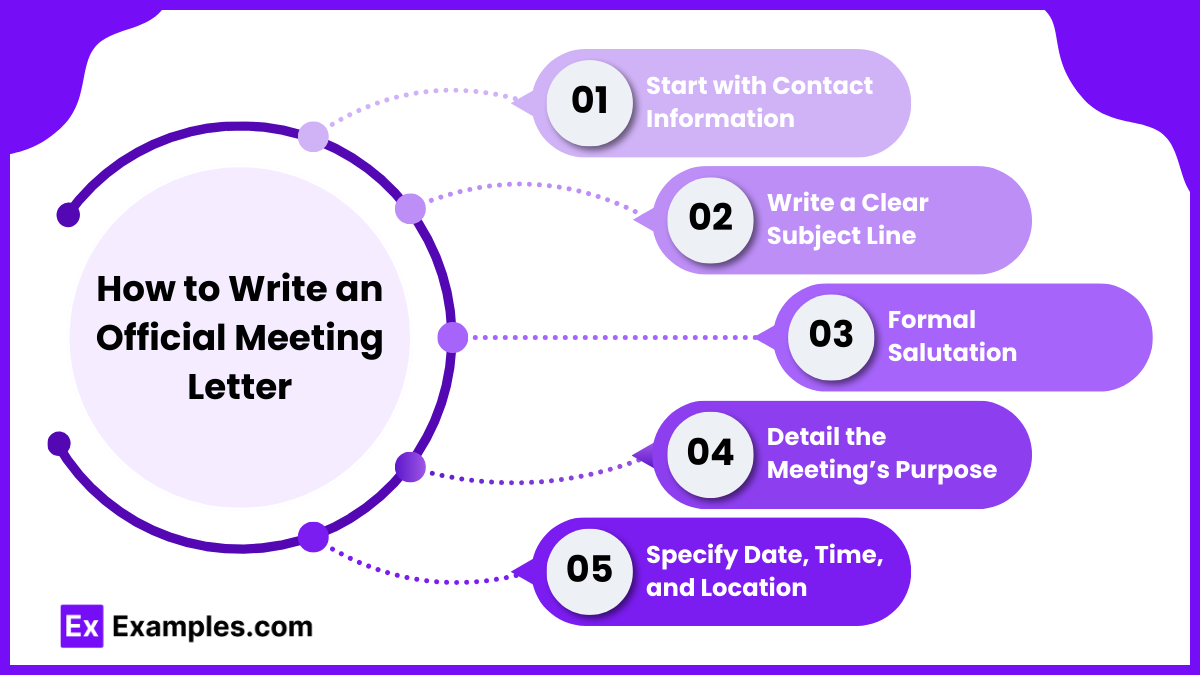
- Start with Contact Information: Begin the letter with your name, position, organization, address, and contact details followed by the recipient’s name, position, organization, and address.
- Write a Clear Subject Line: Clearly state the purpose of the letter in the subject line, such as “Invitation to Discuss Project X” or “Request for Meeting on YY Date.”
- Formal Salutation: Use a formal salutation that addresses the recipient appropriately, such as “Dear Mr./Ms. [Last Name],” to maintain professionalism.
- Detail the Meeting’s Purpose: Clearly explain the purpose of the meeting, including specific topics to be discussed, in a concise manner. Mention the importance of the meeting and how it relates to both parties.
- Specify Date, Time, and Location: Provide all logistical details, including the proposed date, time, and venue of the meeting. Also, request confirmation of the recipient’s availability and provide your contact details for any further clarification.
Tips for Writing Official Meeting Letter
- Be Concise and Clear: Use clear and direct language to convey the purpose of the meeting. Avoid using overly complex sentences or jargon that might confuse the recipient.
- Provide Complete Details: Include all necessary information such as the meeting’s purpose, date, time, location, and agenda. This helps the recipient prepare adequately and ensures they understand the importance of the meeting.
- Formal Tone: Maintain a professional and formal tone throughout the letter. Even if you know the recipient personally, an official meeting letter should reflect professionalism.
- Include a Call to Action: Encourage the recipient to confirm their attendance and provide a method for them to respond, such as a phone number or email address. Specify a deadline for their response if necessary.
- Proofread: Before sending the letter, thoroughly proofread it for any grammatical errors or typos. A well-written letter free of mistakes reflects your attention to detail and respect for the recipient.
FAQs
What should be included in an official meeting letter?
Include the meeting’s purpose, date, time, location, and agenda. Also, request confirmation of attendance and provide contact details for queries.
Can I send an official meeting letter via email?
Yes, an official meeting letter can be sent via email. Ensure the subject line is clear and all meeting details are included in the body of the email.
How early should an official meeting letter be sent?
Send an official meeting letter at least one week in advance to provide recipients ample time to schedule and prepare for the meeting.
What is the difference between an official meeting letter and a memo?
An official meeting letter is formal and sent externally or internally to invite individuals to meetings, while a memo is informal and used for internal communication.


